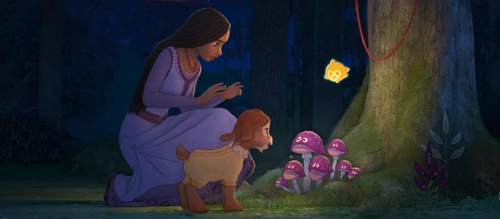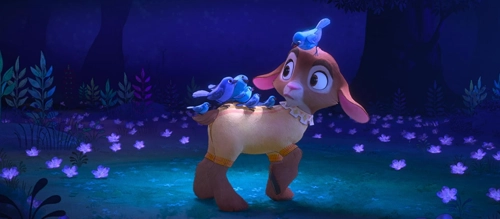Wish (2023) Review

Wish (2023)
Directors: Chris Buck, Fawn Veerasunthorn
Screenwriters: Jennifer Lee, Allison Moore
Starring: Ariana DeBose, Chris Pine, Alan Tudyk, Angelique Cabral, Victor Garber, Natasha Rothwell, Jennifer Kumiyama, Harvey Guillén, Evan Peters, Ramy Youssef, Jon Rudnitsky
One hundred years of Disney. How does one possibly celebrate such an occasion? The little studio that begun with animated movies about a cartoon mouse (and rabbit) almost one hundred years ago now exists as a behemoth of the entertainment industry, owning half of Hollywood as well as the famed Disneyland and Disneyworld theme parks. With so much power, so much history and so many controversies, what could the company plan for their 100th birthday party release Wish that could possibly pay homage to such a legacy?
After undergoing a five year hiatus from releasing original animated movies between 2016’s Moana and 2021’s Raya and the Last Dragon, Disney have gone back to what they do best, what they are most known for, animation. They have returned to their roots in the past few years and released animated pictures like Raya, Encanto, and Strange World, to varying degrees of success.
Wish finds itself set in the wonderful kingdom of Rosas, which is ruled by its king Magnifico (Chris Pine). King Magnifico performs a yearly ritual in which once someone turns 18, they can pass their greatest wish onto him and he will protect it and potentially allow it to come true one day. However, once Asha (Ariana DeBose) discovers that Magnifico’s intentions may not be as pure as they seem, she realises that she must do whatever she can to stop him. Even wishing upon a star.
As is probably obvious from the story of a young girl wishing upon a star, the film finds itself heavily inspired by the famed Disney tune “When You Wish Upon a Star”, which originally featured in Pinocchio but has since become Disney’s signature song. Much like this little reference to the past of the company, the film is also filled to the brim with references that show the journey of Disney from then to now.
It’s a good idea in scope; a nice way to celebrate the history of the studio whilst pushing forward with the new. This is, however, the only facet of the movie that feels at all genuine.
Whilst Disney were patting themselves on the back for how great their company used to be, they forgot to put heart into any other aspects of Wish. Similar to the hand-drawn animation style that the film attempts to replicate, much of Wish is flat and one dimensional.
This disingenuity is most evident in the film’s characters. The main character Asha (voiced by DeBose in perhaps the only memorable vocal performance of the entire film) is given a bit more depth and personality, but the side characters make it clear what was most important to Disney in the making of this film. The supporting cast of Asha’s family, friends and sidekicks is upwards of ten people, all of whom are of varying races, genders and sizes, placing equality, diversity and inclusivity at the forefront of the film to showcase the company’s core values. At least, what the company would like you to think are their core values. This becomes painstakingly obvious through the number “Knowing What I Know Now”, in which the film makes a point to show the differences in the characters through their blocking.

The issue is, these characters are given so little to do and have such little depth that we simply do not care about a single one of them. Though the filmmakers would like us to believe that these are beliefs, values and causes that the studio care about, they do almost nothing to convince us of that fallacy. Instead, the little bit of character that Asha’s friends are afforded is that each of them are inspired by the dwarfs in Snow White and the Seven Dwarfs. This once again proves that what Disney cares about the most is patting themselves on the back.
Wish essentially only exists as a form of corporate self-fellatio that is as insufferable to watch as it is to write about.
Coming in at only ninety-five minutes, the centenary celebration of Walt Disney Studios moves along at a breakneck pace, showing us that even the execs up at Disney HQ wanted this one to be over just as quickly as we did. This simultaneously illustrates just how little care was put into the story aspects of the film and how Wish is really just one big advertisement for the company that made it. Come the end of the film, a character asks how they could possibly keep the magic of the Kingdom of Rosas alive, to which another responds “easy, just keep wishing.” What Disney are really saying is “keep buying tickets.”
Just as one man’s trash is another man’s treasure, it must be said that among the garbage there are some nuggets of gold in Wish. The story has a really good idea underpinning it, and the film offers a nice opportunity to create a full-circle moment for the “wish upon a star” fable that Disney is essentially built upon. Going back to the hand-drawn aesthetic is also a nice touch, as is making the film a musical. Given more time, care and passion, Wish could have been something special. All it needed was some heart. The lack thereof in the final product tells us more about the company that made it than anything in Wish ever could.
Wish is a hollow and lazy picture that feeds its audiences the propaganda of Disney, only this time they aren’t even hiding it with the usual magic that pervades throughout their output. Though the kids seeing this film will undoubtedly enjoy it, they deserve better.
Score: 7/24

